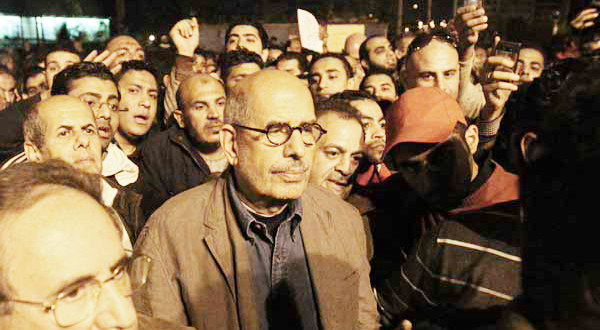 WASHINGTON: Leading Egyptian opposition figure Mohamed ElBaradei said he was "not invited" to take part in negotiations Sunday on the future of a post-Mubarak Egypt, and criticized the talks as "opaque."
WASHINGTON: Leading Egyptian opposition figure Mohamed ElBaradei said he was "not invited" to take part in negotiations Sunday on the future of a post-Mubarak Egypt, and criticized the talks as "opaque."
"I should start by saying I have not been part of the negotiations. I have not been invited to take part in the negotiations or dialogue but I have been following what has been going on," he told NBC television's "Meet the Press" program.
"The process is opaque, nobody knows who is talking to who(m) at this stage."
ElBaradei, who earned a Nobel peace prize for his stewardship of the United Nations atomic watchdog, returned to Cairo shortly after mass public protests erupted last month against Hosni Mubarak's autocratic regime.
He criticized the official political dialogue — the first of its kind in half a century — as being managed by the "outgoing regime" without including the "new opposition."
"It is managed by Vice President (Omar) Suleiman and it is all managed by the military," ElBaradei continued.
"That's part of the problem: the president is a military man, the vice-president is a military man and the prime minister is a military man, and I think if you really want to breed confidence you really need to engage the rest of the civilians."
He suggested a "transitional period" where a three-person presidential council including the military would run an interim government.
The veteran diplomat, who was well respected internationally but little known on the Egyptian street, has become a key opposition figure during days of brutal protests against Mubarak that have left scores dead and injured.
"A huge lack of confidence" remains between the government and the demonstrators, he added.
"There is a good deal of fear that the government will retrench and then come back again with vengeance, if you like."
For the past two weeks, Egypt has been paralyzed by a wave of protests against Mubarak's rule, and Suleiman, a former intelligence chief, has been thrust into center stage as a leader who might negotiate a deal on democratic reforms.
Mubarak, who appointed Suleiman as the first vice president of his 30-year rule, has said he will not run for re-election in September polls, but opposition groups say this is not enough, and are calling for him to leave office while elections are quickly organized.
ElBaradei also criticized Washington's mixed messages.
US President Barack Obama's administration is having to quickly back-pedal after a returning envoy apparently spoke out of turn when he suggested that Mubarak should remain in office to manage the transition.
Obama and US Secretary of State Hillary Clinton have not explicitly called for Mubarak to leave immediately but have repeatedly stressed that the United States wants an orderly transition to begin now.
The remarks on Saturday by Frank Wisner, a veteran diplomat who met with Mubarak at Obama's behest earlier this week, "created a lot of confusion, a lot of disappointment" in Egypt, ElBaradei told CNN.
He elaborated more colorfully in another interview. It "came down here like a piece of lead," he told NBC's "Meet the Press."



